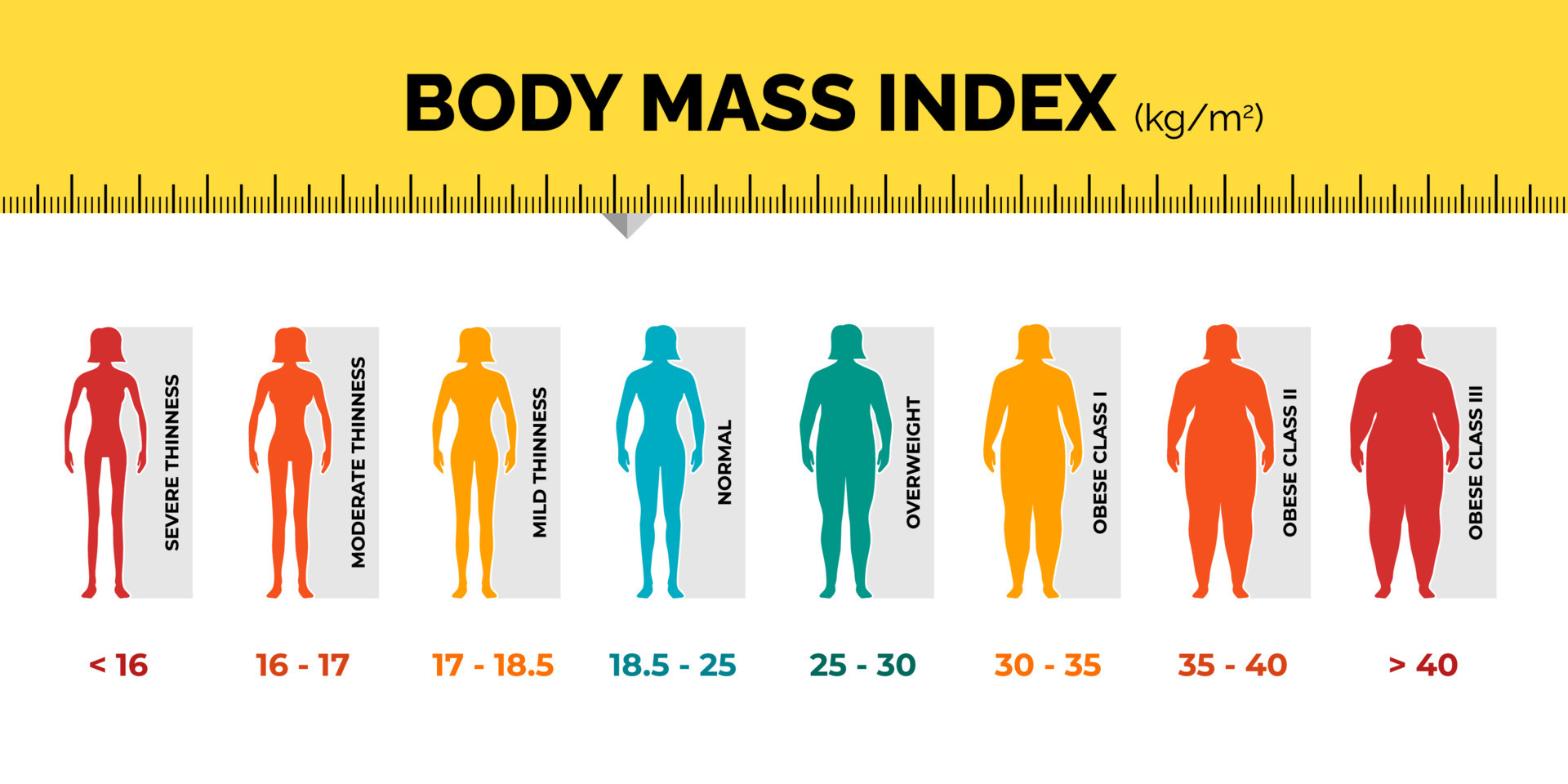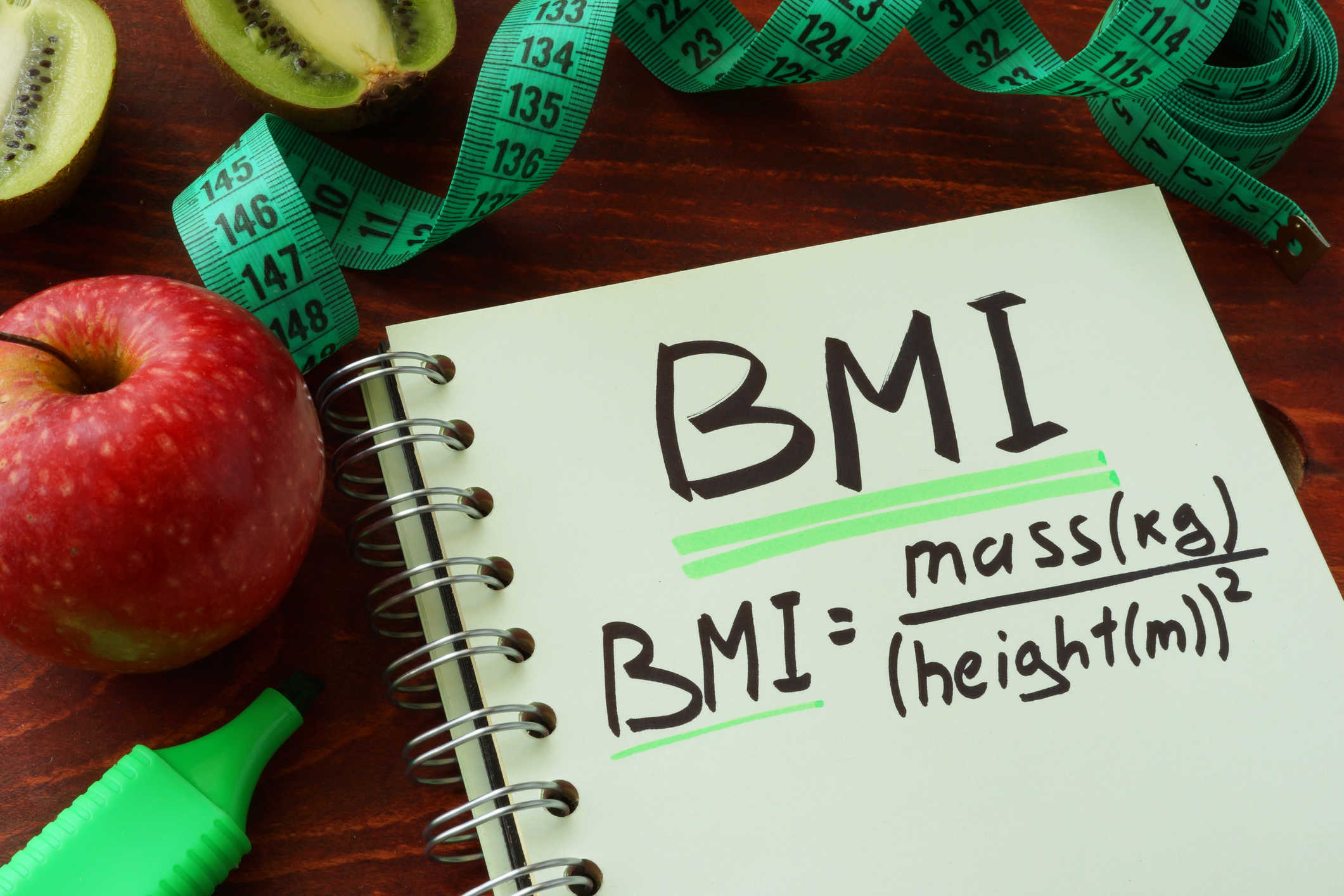Trying to lower your BMI naturally?
Download our free list of 35+ Zero Calorie Foods.
BMI Categories & Surgery Eligibility
| BMI Range | Status | Surgery Eligible? |
|---|---|---|
| Below 18.5 | Underweight | No |
| 18.5 – 24.9 | Healthy | No |
| 25.0 – 29.9 | Overweight | No |
| 30.0 – 39.9 | Obese | Maybe (Check Now) |
| 40.0+ | Morbid Obesity | YES – Apply Now |
BMI Weight Scale (Adults)
| BMI Range | Weight Status | Surgery Eligible? |
|---|---|---|
| Below 18.5 | Underweight | No |
| 18.5 – 24.9 | Healthy Weight | No |
| 25.0 – 29.9 | Overweight | No |
| 30.0 – 39.9 | Obese | Maybe (Check Requirements) |
| 40.0 and Above | Morbid Obesity | YES (Qualifies) |
You’ve likely heard about something called “BMI” from your doctor. BMI stands for body mass index. Your height and weight are used in a straightforward calculation to determine your approximate body fat percentage. Understanding your BMI can help you keep your body healthy. This article explains what BMI means and how to use BMI calculators to check your score.
This simple yet effective device can provide insights into our body mass index, offering a quick glimpse into our general health status. In this comprehensive guide, we’ll explore everything from the BMI calculator for teens to the importance of understanding your body fat percentage. So, let’s dive in and demystify these terms together.
Once you know your BMI, the next step is understanding your options. Read our Complete Guide to Bariatric Surgery in 2026 to compare procedures and costs.
What is BMI?
Your weight and height are compared using the BMI calculation. It gives you a rough idea of how much body fat you have. Doctors use BMI scores to check for potential weight problems in adults and kids. However, BMI doesn’t directly measure body fat. Muscle also contributes to your weight. So athletes could have a high BMI without much fat.
What is a BMI Calculator?
![]()
A BMI calculator is a tool that measures your body mass index (BMI). It’s a simple method that takes your height and weight into account to determine how much body fat you have. While it’s not a direct measure of body fat, it can serve as a useful gauge of the health hazards connected to being underweight or overweight. For teens, adults, and even children, knowing your BMI can be the first step toward managing your health better.
BMI Ranges with division?
BMI helps divide weight status into groups:
- Underweight = BMI below 18.5
- Healthy weight = BMI from 18.5 to 24.9
- Overweight = BMI from 25 to 29.9
- Obese = BMI over 30
As you move into higher BMI ranges, the risks go up for specific health issues like heart disease and type 2 diabetes. Talk to your doctor about your BMI number and what it means for your health.
Is your BMI over 30?
You may qualify for safe, effective weight loss surgery options like the Gastric Sleeve.
Steps in Checking Your BMI

Figuring out your BMI is simple with online BMI calculators. You need to enter your current height and weight. Here are the steps:
- Go to a BMI calculator website or app. Some options:
- BMI Calculator for Adults (CDC)
- BMI Percentile Calculator specially designed for Child and Teen (CDC)
- Enter your weight in pounds or kilograms. Make sure to use your current weight.
- Enter your height in feet/inches or centimeters. Provide your precise height.
- Click “Calculate”. Your BMI number will appear.
- Check which BMI category you fall under based on the groups listed above.
Easy. Now, let’s look at how and why to use BMI readings to improve your health.
Using Your BMI to Guide Weight Goals

So, you’ve calculated your BMI. What now? Here are some ideas:
- Focus on whole body health. Refrain from fixing too much on specific BMI numbers. BMI should be one tool for assessing health.
- Talk to your doctor about key signs like blood pressure, cholesterol, and blood sugar.
- Set exercise activity goals if needed. Increase physical activity if you have a BMI signaling overweight or obesity. Even 30 minutes a day of walking can add up. Exercise that strengthens muscles is also essential.
- Evaluate your calorie intake. Use a calorie calculator online to see if you need to adjust your diet. Aim to cut out 500-1000 calories per day from your maintenance level to lose weight safely.
- Check on apps and sites like MyFitnessPal to log meals and count calories eaten daily. Removing empty-calorie foods is an excellent first step.
- Focus on whole grains, lean protein, fruits and veggies. This offers nutrients to help you feel satisfied with fewer calories.
- Consider speaking to a dietitian if making significant changes to your eating habits. They can help you develop an eating plan tailored to your health status, activity level, food preferences, and weight goals.
BMI for Teens: Why Does It Matters?

Teen years are a critical time for growth and development, making it essential to maintain a healthy weight. A BMI calculator for teens can help identify potential health issues early. It takes into account the age and sex of the teen to provide a more accurate health assessment than the standard adult BMI calculator.
How Many Calories Should I Eat a Day?
It’s essential to know how many calories you need each day to maintain your weight. Your calorie intake depends on several factors, comprising height, weight, age, sex, and degree of physical activity. Generally, consuming fewer calories than your body expends causes weight reduction, but ingesting more can cause weight gain of calories you ought to eat in order to reach your weight reduction objectives. If you’re trying to lose weight, a calorie deficit calculator will help you figure out how many calories you should be consuming.
What’s a Healthy Weight?
You may wonder, “What should I weigh for my height?” There are a few ways to evaluate this besides BMI:
Use standard height/weight charts. These show healthy weight ranges based on averages. But muscle mass influences outcomes, so the chart could be more precise.
Input stats into ideal weight calculators. Just be aware they make generalizations. Your best weight could differ based on your body composition and density.
Ask your doctor. After completing exams and factoring in your medical history, they can suggest a recommended weight range.
The most important focus should be on feeling healthy and having energy for daily activities. Pay attention to how your body feels over worrying about numbers.
Essential Facts to Remember About BMI
While BMI can be helpful, there are some fundamental limitations to consider:
BMI is not an exact body fat measurement. The calculation only uses height and weight, not age, gender, or muscle mass. So, athletes may have higher BMIs without negative health impacts.
The health impacts of BMI vary by age and ethnicity. For example, some evidence shows that current BMI cutoffs underestimate risks for many people of Asian descent.
Very muscular individuals can have overweight or obese BMIs. There may be more information on athletic body types available from other metrics like body fat percentage or waist circumference.
Because children’s body compositions vary so much with age, growth charts are used to plot children’s BMIs for comparison.
Even with limitations, checking BMI periodically and other health markers can help you take steps toward positive lifestyle changes when needed.
Tracking Progress Over Time
Don’t stress too much over one BMI reading. Look for trends in your BMI over weeks and months to gauge progress as you work toward healthier habits.
Consistency is key. Use one reliable scale to weigh yourself under similar conditions. And check BMI monthly or quarterly versus daily fluctuations.
Other helpful metrics include body measurements with a measuring tape and body fat percentage using smart scales or handheld devices. Seeing the numbers drop can keep you motivated!
Small Steps for Big Changes
Improving your BMI takes patience but leads to significant health dividends over time. Begin with the basics:
- Calculate your BMI to establish a starting point and set goals
- Slowly reduce calorie intake and shift to healthier foods
- Incorporate more activity like walking 30 minutes per day
- Re-check your BMI and other measures in a few months
Use online BMI calculators and tools to inform more brilliant, compassionate health choices. Stay consistent and be kind to yourself in the process. Over time, feeling better energized for your relationships, work, and hobbies will be the ultimate reward.
The Importance of a Height and Weight Chart
A height and weight chart offers a quick reference to assess whether your weight is within a healthy range for your height. This can be especially useful for those who prefer visual guides over numerical calculations.
Calculadora de Peso Ideal
For Spanish speakers, a “Calculadora de peso ideal” serves the same purpose as a BMI calculator, helping to determine the optimal weight range based on individual height. This tool is invaluable for anyone looking to maintain a healthy lifestyle, regardless of their primary language.
Exploring Weight Loss Injections
In the quest for weight loss solutions, injections have emerged as an option for some. It’s essential to approach these treatments cautiously and consult healthcare professionals for personalized advice.
Height: A Key Factor in BMI Calculation
Your height is crucial in calculating your BMI, as it helps determine the appropriate weight range for your body frame. Accurate measurement is essential for a reliable BMI result.
Calorie Deficit Calculator: A Tool for Weight Management
A calorie deficit calculator can guide you on how many calories you need to cut from your diet to lose weight. It’s a practical approach to weight management that balances calorie intake with your body’s energy needs.
BMI Calculator Software: Modern Solutions for Health
With technological advancements, BMI calculator software has become widely accessible. These programs offer a user-friendly interface for quick and easy BMI calculation, suitable for personal and professional use.
Kilogram: The Unit of Mass in BMI Calculation
In BMI calculations, weight is typically measured in kilograms, a standard unit of mass in the metric system. For individuals who are more accustomed to the imperial system, knowing how to convert pounds to kilograms can be useful.
Body Fat Percentage: Beyond BMI
While BMI provides a general overview of body fat, knowing your body fat percentage offers a more detailed insight into your health. Accurate body fat estimation can be achieved by many techniques, such as skinfold measurements and bioelectrical impedance analysis.
Conclusion
Understanding and utilizing tools like the BMI calculator is a step forward in managing your health and wellness. Whether you’re a teen or adult or concerned about your child’s growth, these resources provide valuable insights into maintaining a healthy balance. Remember, while BMI, calorie intake, and body fat percentage are important, they’re just part of the bigger picture.
A healthy lifestyle involves balanced nutrition, regular physical activity, and mental well-being. Always consult with healthcare professionals before significantly changing your diet or fitness routine, especially when considering options like weight loss injections.
In the end, our health journey is uniquely our own. Tools like BMI calculators and calorie deficit calculators serve as guides, but listening to our bodies and making informed choices is critical to achieving and maintaining a healthy life. Let’s embrace the journey with knowledge, care, and a positive outlook toward our health goals.
FAQs
-
What is a healthy BMI range for teens?
A healthy BMI for teens is typically between the 5th and 85th percentiles. However, it’s best to consult a doctor for personalized advice.
-
Why is BMI important for teenagers?
BMI helps assess if a teen is at a healthy weight for their height. An unhealthy BMI could indicate potential health risks or nutrient deficiencies during critical growth years.
-
How many calories should a teenager eat per day?
Calorie needs can vary based on age, gender, activity level, and growth phase. Generally, active teen boys need 2,800-3,200 calories per day, and active teen girls need 2,200-2,800 calories per day.
-
What factors influence daily calorie needs?
Daily calorie needs depend on age, gender, height, weight, activity level, muscle mass, and overall health goals (weight loss, gain, or maintenance).
-
What is a height and weight chart used for?
Height and weight charts help determine if an individual’s weight falls within a healthy range for height, age, and gender.
-
How accurate are height and weight charts?
Height and weight charts provide general guidelines but may not account for factors like muscle mass, bone density, or body composition.
-
What are weight loss injections, and how do they work?
Weight loss injections are medications like semaglutide or liraglutide that help suppress appetite and promote feelings of fullness which in turn gives rise to reduced calorie intake and potential weight loss.
-
Are weight loss injections safe for everyone?
Weight loss injections are not a good idea for everyone and can have side effects. They should only be used under medical supervision after considering individual health factors.
-
How is height measured accurately?
Height is most accurately measured in the morning, without shoes, standing straight against a wall with feet flat, and looking straight ahead.
-
Can height be increased after reaching adulthood?
For most people, height cannot be increased after reaching skeletal maturity in late adolescence or early adulthood. However, some medical conditions or treatments may affect height.
For evidence-based guidance, visit BeLiteWeight resources.
Learn more from NIDDK about healthy lifestyle and nutrition.
Also read: A Complete Bariatric Surgery Guide.










